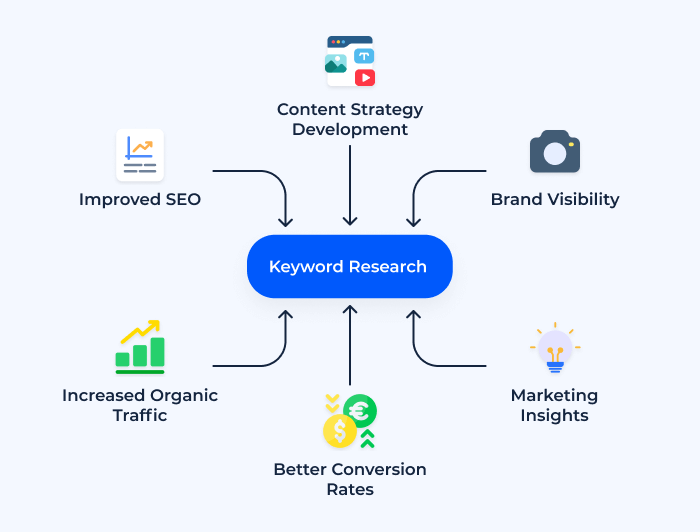Introduction: The Importance of Keyword Research
It is the foundation upon which successful SEO strategies are built. In the vast landscape of the internet, where billions of searches are conducted every day, understanding what people are searching for is crucial for businesses aiming to enhance their online visibility. This introductory section sets the stage for a comprehensive exploration of keyword research, highlighting its pivotal role in driving organic traffic and achieving digital marketing goals.
The Power of Keyword Research
At its core, It empowers businesses to align their online content with user intent. By deciphering the language of search queries, businesses can strategically optimize their websites to appear prominently in search engine results pages (SERPs) when users seek information relevant to their products or services. The power of keyword research lies in its ability to connect businesses with their target audience at the precise moment of need, driving qualified traffic and facilitating conversions.
Understanding the Basics
Effective keyword research yields a multitude of benefits for businesses seeking to enhance their online presence. Beyond simply identifying popular search terms, comprehensive keyword research helps businesses:
- Identify relevant topics and phrases that resonate with their target audience.
- Gauge the search volume associated with specific keywords to prioritize content creation efforts.
- Assess the level of competition for targeted keywords and identify opportunities for optimization.
- Align content with user intent to improve engagement, conversion rates, and overall website performance.
By leveraging the insights gleaned from keyword research, businesses can tailor their digital marketing strategies to meet the evolving needs and preferences of their audience, ultimately driving sustainable growth and success.
Discovering Valuable Keyword Phrases and Topics
It serves as a gateway to uncovering a wealth of valuable insights into user behavior and preferences. By delving deep into keyword data, businesses can discover relevant phrases and topics that users are actively searching for. This process involves:
- Identifying primary keywords related to the products, services, or content offerings of the business.
- Exploring related search queries and long-tail keywords that offer opportunities for niche targeting.
- Analyzing trends and seasonal variations in keyword search volume to inform content planning and promotional strategies.
By embracing a data-driven approach to keyword discovery, businesses can expand their content roadmap, capture new audiences, and stay ahead of the competition in an ever-evolving digital landscape.
Finding Keywords with Sufficient Search Volume
In the vast ocean of online search, not all keywords are created equal. While some terms may enjoy widespread popularity and high search volumes, others may attract relatively little attention. Understanding the search volume associated with specific keywords is essential for prioritizing content creation efforts and maximizing the impact of SEO strategies. Key considerations in evaluating keyword search volume include:
- Identifying keywords with sufficient search volume to justify content investment and optimization efforts.
- Balancing broad, high-volume keywords with targeted, niche-specific terms to optimize content for diverse audience segments.
- Monitoring keyword trends and seasonality to capitalize on emerging opportunities and adapt content strategies accordingly.
By conducting thorough research into keyword search volume, businesses can optimize their content strategy to attract a steady stream of organic traffic and maintain a competitive edge in their industry.
Navigating Keyword Competition
While search volume provides valuable insights into keyword popularity, competition levels determine the feasibility of ranking for specific terms in SERPs. Evaluating keyword competition involves assessing the level of competition faced by businesses vying for visibility in search results. Key considerations in navigating keyword competition include:
- Analyzing the domain authority and backlink profiles of competitors ranking for target keywords.
- Identifying gaps and opportunities in the competitive landscape to refine content strategies and gain a competitive edge.
- Leveraging competitive analysis tools and techniques to benchmark performance and track progress over time.
By adopting a strategic approach to keyword competition analysis, businesses can identify untapped opportunities, optimize their SEO efforts, and position themselves for success in highly competitive search environments.
Crafting a Complete Content Strategy
It serves as the cornerstone of a comprehensive content strategy, guiding businesses in the creation and optimization of digital content across various online channels. Crafting a complete content strategy involves:
- Mapping keywords to relevant topics and content themes to ensure alignment with user intent and business objectives.
- Developing an editorial calendar and content roadmap based on keyword research insights to guide content creation and publication schedules.
- Optimizing on-page elements such as title tags, meta descriptions, and header tags to incorporate target keywords and enhance search visibility.
- Incorporating multimedia elements such as images, videos, and infographics to enrich the user experience and improve engagement metrics.
By integrating keyword research into every stage of the content creation process, businesses can create compelling, relevant content that resonates with their target audience and drives meaningful interactions and conversions.
Leveraging Competitive Analysis
In addition to identifying keyword opportunities, competitive analysis plays a crucial role in informing content strategy and optimizing SEO efforts. By analyzing competitor websites and search performance, businesses can gain valuable insights into:
- Keywords driving traffic to competitor websites and identifying opportunities for optimization and expansion.
- Content gaps and opportunities within the competitive landscape to differentiate offerings and capture market share.
- Backlink profiles and off-page SEO strategies employed by competitors to inform link-building efforts and enhance domain authority.
By leveraging competitive analysis tools and techniques, businesses can gain a deeper understanding of their competitive landscape, refine their SEO strategies, and achieve sustainable growth and success in their digital marketing endeavors.
Conclusion: Empowering SEO Success Through Keyword Research
In conclusion, It remains a fundamental pillar of effective SEO strategies, guiding businesses in the creation and optimization of digital content to maximize visibility, engagement, and conversions. By harnessing the power of keyword research, businesses can gain valuable insights into user behavior, preferences, and intent, enabling them to craft compelling, relevant content that resonates with their target audience and drives meaningful interactions and conversions. As the digital landscape continues to evolve, businesses that prioritize research and data-driven insights will be better positioned to adapt to changing market dynamics, stay ahead of the competition, and achieve long-term success in the competitive world of online marketing.







